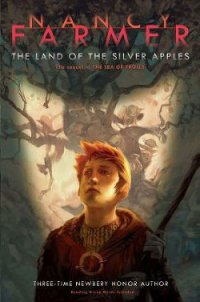Tehanu The Last Book of Earthsea - Le Guin Ursula Kroeber (читать бесплатно книги без сокращений TXT) 📗
“I’ve been thinking,” she said at last, setting straight the four dishes on the oaken sideboard, “that it’s time I was getting back to my farm.”
He said nothing. Possibly he nodded, but her back was turned .
She was tired all at once, wanting to go to bed; but he sat there in the front part of the house, and it was not yet entirely dark; she could not undress in front of him. Shame made her angry. She was about to ask him to go out for a while when he spoke, clearing his throat, hesitant.
“The books. Ogion’s books. The Runes and the two Lore-books. Would you be taking them with you?”
“With me?”
“You were his last student.”
She came over to the hearth and sat down across from him on Ogion’s three-legged chair.
“I learned to write the runes of Hardic, but I’ve forgotten most of that, no doubt. He taught me some of the language the dragons speak. Some of that I remember. But nothing else. I didn’t become an adept, a wizard. I got married, you know. Would Ogion have left his books of wisdom to a farmer’s wife?”
After a pause he said without expression, “Did he not leave them to someone, then?”
“To you, surely.”
Sparrowhawk said nothing.
“You were his last prentice, and his pride, and friend. He never said it, but of course they go to you.
“What am I to do with them?”
She stared at him through the dusk. The western window gleamed faint across the room. The dour, relentless, unexplaining rage in his voice roused her own anger.
“You the Archmage ask me? Why do you make a worse fool of me than I am, Ged?”
He got up then. His voice shook. “But don’t you-can’t you see-all that is over-is gone!”
She sat staring, trying to see his face.
“I have no power, nothing. I gave it-spent it-all I had. To close- So that- So it’s done, done with.”
She tried to deny what he said, but could not.
“Like pouring out a little water,” he said, “a cup of water onto the sand, In the dry land. I had to do that. But now I have nothing to drink. And what difference, what difference did it make, does it make, one cup of water in all the desert? Is the desert gone?-Ah! Listen!-It used to whisper that to me from behind the door there: Listen, listen! And I went into the dry land when I was young. And I met it there, I became it, I married my death. It gave me life. Water, the water of life, I was a fountain, a spring, flowing, giving, But the springs don’t run, there. All I had in the end was one cup of water, and I had to pour it out on the sand, in the bed of the dry river, on the rocks in the dark. So it’s gone. It’s over. Done.”
She knew enough, from Ogion and from Ged himself, to know what land he spoke of, and that though he spoke in images they were not masks of the truth but the truth itself as he had known it. She knew also that she must deny what he said, no matter if it was true. “You don’t give yourself time, Ged,” she said. “Coming back from death must be a long journey-even on the dragon’s back. It will take time. Time and quiet, silence, stillness. You have been hurt. You will be healed.”
For a long while he was silent, standing there. She thought she had said the right thing, and given him some comfort. But he spoke at last.
“Like the child?”
It was like a knife so sharp she did not feel it come into her body.
“I don’t know,” he said in the same soft, dry voice, “why you took her, knowing that she cannot be healed. Knowing what her life must be. I suppose it’s a part of this time we have lived-a dark time, an age of ruin, an ending time. You took her, I suppose, as I went to meet my enemy, because it was all you could do. And so we must live on into the new age with the spoils of our victory over evil. You with your burned child, and I with nothing at all.”
Despair speaks evenly, in a quiet voice.
Tenar turned to look at the mage’s staff in the dark place to the right of the door, but there was no light in it. It was all dark, inside and out. Through the open doorway a couple of stars were visible, high and faint. She looked at them. She wanted to know what stars they were. She got up and went groping past the table to the door. The haze had risen and not many stars were visible. One of those she had seen from indoors was the white summer star that they called, in Atuan, in her own language, Tehanu. She did not know the other one. She did not know what they called Tehanu here, in Hardic, or what its true name was, what the dragons called it. She knew only what her mother would have called it, Tehanu, Tehanu. Tenar, Tenar . . .
“Ged,” she said from the doorway, not turning, “who brought you up, when you were a child?”
He came to stand near her, also looking out at the misty horizon of the sea, the stars, the dark bulk of the mountain above them.
“Nobody much,” he said. “My mother died when I was a baby. There were some older brothers. I don’t remember them. There was my father the smith. And my mother’s sister. She was the witch of Ten Alders.”
“Aunty Moss,” Tenar said.
“Younger. She had some power.
“What was her name?”
He was silent.
“I cannot remember,” he said slowly.
After a while he said, “She taught me the names. Falcon, pilgrim falcon, eagle, osprey, goshawk, sparrowhawk
“What do you call that star? The white one, up high.”
“The Heart of the Swan,” he said, looking up at it. “In Ten Alders they called it the Arrow.”
But he did not say its name in the Language of the Making, nor the true names the witch had taught him of hawk, falcon, sparrowhawk.
“What I said-in there-was wrong,” he said softly. “I shouldn’t speak at all. Forgive me.
“If you won’t speak, what can I do but leave you?” She turned to him. “Why do you think only of yourself? always of yourself? Go outside awhile,” she told him, wrathful. “I want to go to bed.”
Bewildered, muttering some apology, he went out; and she, going to the alcove, slipped out of her clothes and into the bed, and hid her face in the sweet warmth of Therru’s silky nape.
“Knowing what her life must be . . . “
Her anger with him, her stupid denial of the truth of what he told her, rose from disappointment. Though Lark had said ten times over that nothing could be done, yet she had hoped that Tenar could heal the burns; and for all her saying that even Ogion could not have done it, Tenar had hoped that Ged could heal Therru-could lay his hand on the scar and it would be whole and well, the blind eye bright, the clawed hand soft, the ruined life intact.
“Knowing what her life must be . . . “
The averted faces, the signs against evil, the horror and curiosity, the sickly pity and the prying threat, for harm draws harm to it . . . And never a man’s arms. Never anyone to hold her. Never anyone but Tenar. Oh, he was right, the child should have died, should be dead. They should have let her go into that dry land, she and Lark and Ivy, meddling old women, softhearted and cruel. He was right, he was always right. But then, the men who had used her for their needs and games, the woman who had suffered her to be used-they had been quite right to beat her unconscious and push her into the fire to burn to death. Only they had not been thorough. They had lost their nerve, they had left some life in her. That had been wrong. And everything she, Tenar, had done was wrong. She had been given to the dark powers as a child: she had been eaten by them, she had been suffered to be eaten. Did she think that by crossing the sea, by learning other languages, by being a man s wife, a mother of children, that by merely living her life, she could ever be anything but what she was-their servant, their food, theirs to use for their needs and games? Destroyed, she had drawn the destroyed to her, part of her own ruin, the body of her own evil.
The child’s hair was fine, warm, sweet-smelling. She lay curled up in the warmth of Tenar’s arms, dreaming. What wrong could she be? Wronged, wronged beyond all repair, but not wrong. Not lost, not lost, not lost. Tenar held her and lay still and set her mind on the light of her dreaming, the gulfs of bright air, the name of the dragon, the name of the star, Heart of the Swan, the Arrow, Tehanu.




